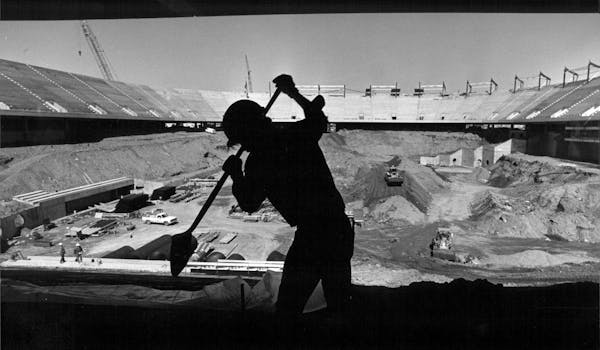During a 12-month period that began with the Minnesota North Stars playing in the Stanley Cup Final in May 1991, the Twin Cities was, in the words of New York Times columnist George Vecsey, "the sports capital of the United States."
In one incredible, whirlwind 11-month period, Minnesota was host to the NHL Final, the U.S. Open golf tournament, the World Series, the Super Bowl and the NCAA Final Four.
The final three of those events were held in the Metrodome, which will be dismantled to make way for a new stadium. The Dome still can claim the distinction of being the only sports facility in America to have been host to a Super Bowl (1992), World Series (1987, 1991), MLB All-Star Game (1985) and the Final Four (1992, 2001).
"I knew in my gut this plastic place would become a thing of affection," Don Poss, who headed the Metropolitan Sports Facilities Commission during the building of the Dome, told the Star Tribune in a 1991 interview.
The American sporting public, like many if not most Minnesotans, grudgingly gained respect for the Metrodome during that frenzied 11-month period. If it wasn't the perfect facility for some of the events it hosted — baseball purists still maintained the game was meant to be played outdoors, and the cavernous covered stadium was too big to be a great basketball arena — the Dome garnered well-deserved praise its versatility.
And Minnesotans gained national prominence for being such gracious hosts to America's sports fans.
Vecsey, in the last lines of his column after Duke's victory over Michigan in the 1992 Final Four that ended the Dome's memorable run as host arena, wrote: "Then, this morning, state marshals will round up the out-of-towners and escort us to the airport. They do not want us to disturb the fragile ecological balance of politeness and industriousness and civic-mindedness in Minneapolis. It's been fun, but it's over."
Here's a recap of the three major events that the Dome hosted between October 1991 and April 1992:
1991 World Series
Baseball fans appeared to have only tepid interest in the matchup between the Atlanta Braves and the Twins, lamenting the absence of teams like the Yankees, Red Sox and Dodgers. By the time the Series ended, it was regarded as one of the greatest in history.
Atlanta, which like the Twins had become the first team to go from last place in a division the year before to the World Series, went up 3-2 after five games, which included three consecutive one-run victories by the Braves.
The best was yet to come.
The Twins staved off elimination in Game 6 in a game that will forever be remembered for Kirby Puckett's exploits. In what is regarded as the greatest game ever played by a Twin, Puckett leapt against the fence in the third inning to rob Ron Gant of at least an extra-base hit and the Braves of at least one run. Puckett added an RBI triple, a sacrifice fly, a single, a stolen base and scored a run. Then he topped it off with an 11th-inning leadoff homer, promoting the memorable line by announcer Jack Buck: "And we'll see you — tomorrow night."
No less amazing was Game 7, which belonged to Jack Morris. The St. Paul native pitched 10 shutout innings, keeping the Twins alive until Gene Larkin's fly-ball single scored Dan Gladden in the bottom of the 10th inning.
Baseball Commissioner Fay Vincent was moved to proclaim the seven games "probably the greatest World Series ever."
1992 Super Bowl
The NFL's annual championship gala was considerably less dramatic than the '91 Series. The Washington Redskins trounced Buffalo 37-24 in Super Bowl XXVI in a game that was not as close as the final score.
The Redskins, featuring an offensive line dubbed "The Hoggs," jumped to a 24-0 lead early in the third quarter. Washington quarterback Mark Rypien was the Super Bowl MVP, completing 18 of 33 passes or 292 yards and two touchdowns.
Remember these trivia answers: Harry Connick Jr. sang the national anthem. The halftime show was titled "Winter Magic" and featured dancers and former Olympic figure skaters Brian Boitano and Dorothy Hamill skating on sheets of Teflon. The singer was Gloria Estefan, and people still are trying to figure out her link to a winter motif halftime show.
1992 Final Four
The Final Four was a natural draw for Minnesotans, featuring a pair of Big Ten teams — Indiana and Michigan's fabled Fab Five, an all-freshman starting lineup. The foursome was completed by Duke and Cincinnati, making it one of the top Final Fours in matching traditional college basketball powers.
The four teams have a running total of 35 Final Four appearances and 12 national titles (five for Indiana, four for Duke, two for Cincinnati and one for Michigan).
Duke emerged from the field to claim its second consecutive national title, beating Michigan 71-51 in the title game. Guard Bobby Hurley was selected the tournament's Most Outstanding Player.
History will judge the greatest game of the 1992 tournament as Duke's 104-103 East Regional final victory over Kentucky in which, with 2.1 seconds remaining in overtime, Grant Hill threw a length-of-the-court pass to Christian Laettner, who had the presence of mind to dribble once, turn and sink the winner. Laettner went on to become the Timberwolves' No. 1 draft pick, enjoying moderate success with the Minnesota franchise.
The game attracted 50,379, at the time the third-highest figure for a championship game behind two Final Four played at the Louisiana Superdome in New Orleans.
